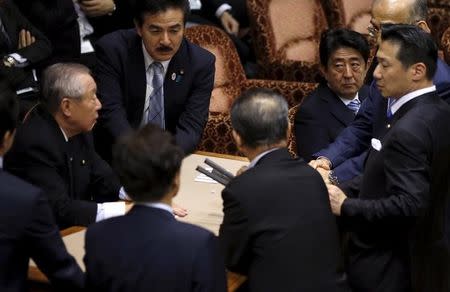Japan opposition tries to halt vote on contentious security bills

By Linda Sieg TOKYO (Reuters) - Japanese opposition lawmakers were battling on Thursday to prevent a vote on security bills that could allow troops to fight abroad for the first time since World War Two, part of Prime Minister Shinzo Abe's agenda to ease the limits of the pacifist constitution. The policy shift, which Abe says is vital to meet challenges such as a rising China, has sparked huge public protests and sharply eroded popular support for the premier. Opponents argue it violates the constitution and fear it could ensnare Japan in U.S.-led conflicts. Objections by shouting and jostling opposition members, who have vowed to block passage before parliament disperses on Sept. 27, delayed the start of an upper house panel whose approval is needed before the full chamber can vote the bills into law. Thousands of demonstrators had rallied the day before near parliament chanting "Scrap the war bills" and "Abe resign" and were gathering in the rain again on Thursday. Media said a ruling party official has threatened to send the legislation back to the lower house, which has approved the bills once and can vote them into law with a two-thirds majority in a second vote if the upper house fails to act. The legal revisions include an end to a decades-old ban on defending a friendly nation under attack, or collective self-defence, when Japan faces a "threat to its survival". The measures expand the scope for logistics support for the militaries of the United States and other countries, and for participation in peacekeeping. Close ally Washington has welcomed Japan's shift, as have some Southeast Asian countries, worried by China's actions to bolster its claims in the disputed South China Sea. China, where there is deep anger over Japan's brutal occupation before and during World War Two, has said the legislation would "complicate" regional security. The revisions will still leave Japan constrained in overseas military operations by legal limits and a deeply rooted public anti-war mindset. "The conditions imposed in the legislation and during the extended debate make it very clear that there will be real limits on what Japan can do and when," said Richard Samuels, director of the Japan programme at Massachusetts Institute of Technology. "It loosens to some degree constraints on some military behaviour, but it ... does so under very strict conditions." Abe has pledged to go ahead with the unpopular revisions despite polls showing the vast majority of voters want a better explanation of why they are needed. (Reporting by Linda Sieg; Editing by Richard Pullin)

